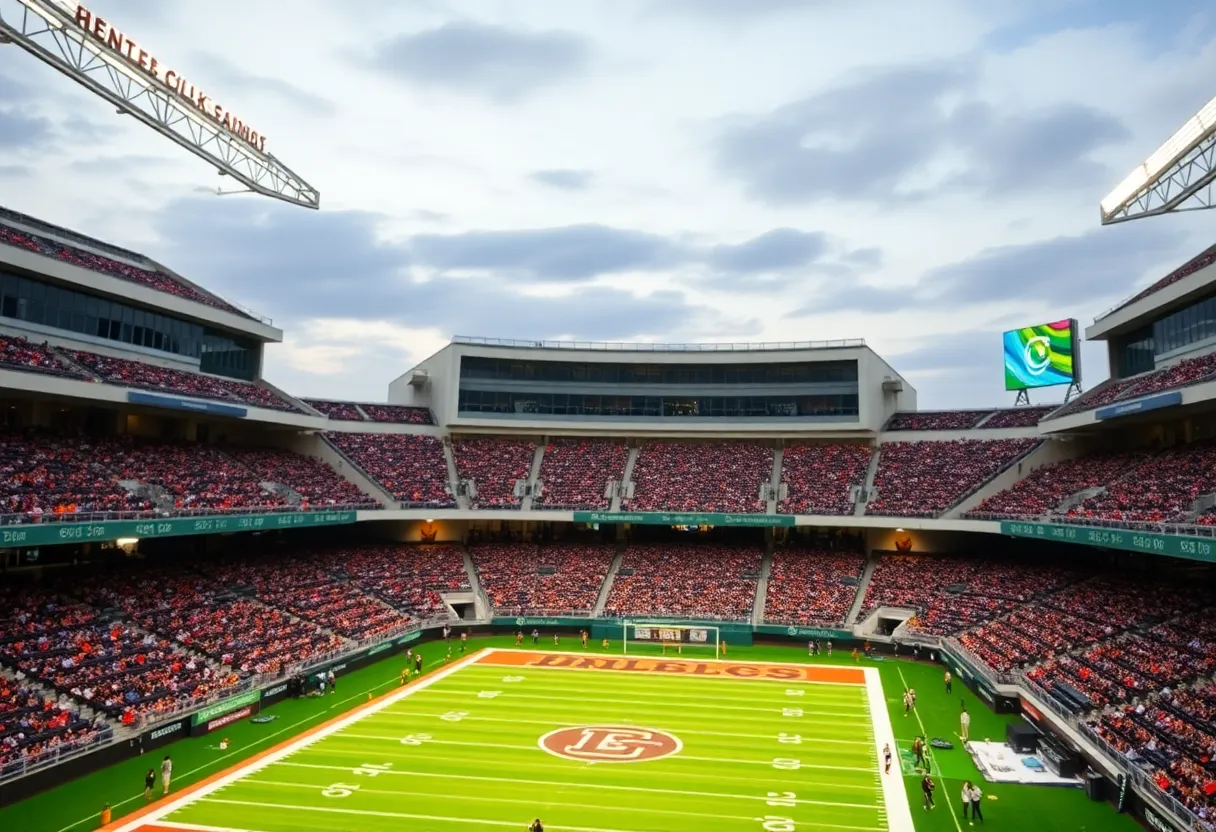News Summary
UCLA’s athletic department is facing a $219.5 million deficit, prompting the appointment of Daniel Cruz as deputy athletics director. In efforts to combat financial challenges, the university is modernizing ticket sales and enhancing the overall fan experience with new facilities and features aimed at boosting attendance and revenue. As it transitions to the Big Ten conference, UCLA seeks innovative strategies to maintain financial health while addressing high operational costs. Cruz’s leadership will be instrumental in navigating these challenges and revitalizing fan engagement in the coming years.
Los Angeles – UCLA’s athletic department is grappling with a significant financial crisis, facing a $219.5 million deficit resulting from six years of consecutive losses. In response to this alarming situation, the university has appointed Daniel Cruz as the new deputy athletics director and chief revenue officer. Cruz, formerly the Vice President of Global Marketing Partnerships at Disney, brings extensive experience in high-level negotiations and strategy development to his new role.
UCLA’s financial outlook for the coming fiscal year appears bleak, with a projected shortfall of $51.8 million anticipated for 2024 alone. As part of efforts to rectify this financial predicament, the university is transitioning from its traditional in-house ticketing process to a partnership with Elevate, aimed at modernizing ticket sales and marketing initiatives. This collaboration is designed to minimize the impact of unauthorized ticket brokers and to introduce dynamic pricing for games that experience lower demand.
Under Cruz’s leadership, an emphasis on revitalizing the overall fan experience has been prioritized. Recognizing a pressing need for transformation within college athletics, he aims to make significant changes that will enhance engagement with supporters. One of the notable plans includes a new courtside lounge at Pauley Pavilion, set to debut before the next season, tailored specifically for high-level donors seeking a premium experience. Similarly, a proposed field-level club at the Rose Bowl is expected to feature a restaurant and bar, as well as plush seating for 1,200 fans, aiming to boost game attendance and create a more inviting atmosphere.
Additionally, the Rose Bowl will bear the estimated $20 million construction costs for the new club, which is seen as a strategic move to increase revenue through enhanced game-day experiences. The venue is also set to introduce a large stage for live events and DJ performances during pregame festivities, which seeks to attract a wider audience and enhance the overall energetic environment.
Ongoing upgrades to stadium facilities, including the installation of a new videoboard and improved stadium seating, are part of UCLA’s comprehensive plan to modernize its offerings. Addressing fan feedback regarding high ticket prices, Cruz has pledged to explore more affordable options for less popular games. Restructuring the Pavilion Club into segmented experiences designed for various demographics, particularly young alumni, is also on the agenda. CUz also plans potential reconfiguration of the lower-level stands to highlight student attendance during broadcasts, promoting a vibrant atmosphere.
UCLA is keen to maintain fan engagement during games by initiating partnerships for in-game entertainment, providing continuous activities during break times. Concurrently, the marketing team will transition into roles as “fan experience specialists”, focusing on fan retention and encouraging repeat attendance through enhanced interactions and offerings. The university is also broadening sponsorship revenue opportunities through athlete features in promotional content.
With UCLA’s move to the Big Ten conference already yielding results, the anticipated increase in annual media rights revenue by approximately $75 million presents a potential boost to the athletic program’s financial health. However, concerns regarding long-term sustainability remain valid, especially as expenses associated with athlete compensation and travel are expected to rise as part of the conference transition. Cruz has pointed out that historical performance in sports does not guarantee financial stability for athletic programs, hinting at the need for continuous adaptation in response to shifting financial landscapes.
The future of UCLA’s athletic department remains uncertain, and Cruz’s innovative strategies will be crucial in determining whether the university can overcome its significant financial challenges and enhance the overall fan experience in the coming years.
Deeper Dive: News & Info About This Topic
HERE Resources
Beverly Hills Tension Amid Teacher Contract Negotiations
Beverly Hills Appoints New Superintendent
Beverly Hills School Board Address Budget Cuts and Initiatives
Hiring Freeze at University of California Due to Budget Cuts
Romeo Carey Reinstated as KBEV Instructor
Additional Resources
- Los Angeles Times: UCLA Athletic Department Revenue Changes
- Wikipedia: UCLA Bruins
- Daily Bruin: UC Board of Regents Special Committee on Athletics
- Google Search: UCLA athletics
- Swimming World Magazine: UCLA Athletics Faces Hard Choices
- Google Scholar: UCLA athletics finances
- UCLA Bruins: Daniel Cruz Named Deputy AD
- Encyclopedia Britannica: UCLA
- Los Angeles Times: UCLA Athletic Department Finances
- Google News: UCLA athletic department





